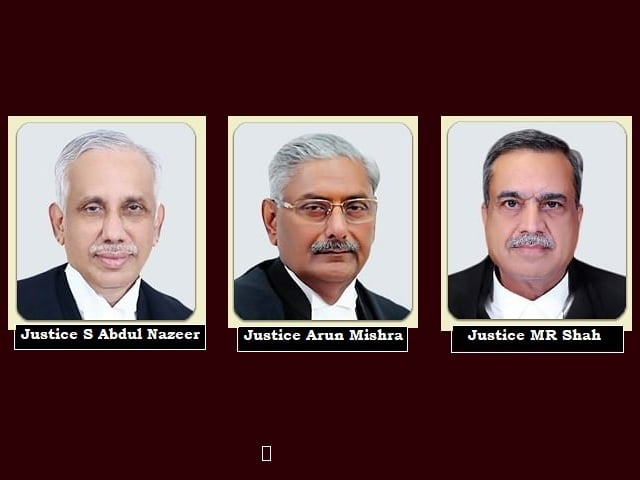On August 11, 2020, a three-Judge Bench of Justice S. Abdul Nazeer, Arun Mishra and MR Shah, passed a verdict in the Supreme Court that declared that daughters would have coparcenary rights (equal share of inheritance) in an Hindu Undivided Family (HUF). This is irrespective of whether the woman in question was born and/or whether her father was alive at the time of the amendments (2005) to the Hindu Succession Act, 1956. This verdict was eagerly anticipated for, as the 2005 Amendment maintained that a daughter would have coparcenary rights like the son, under the condition that both the father and the daughter were alive as of 9th September 2005—the day of the notification of the previous amendment.

The significance of reviewing the Act remains in its real-life manifestations. Personal laws, like the Hindu Succession Act, 1956, govern people in matters of marriage, inheritance, custody as well as separation. These laws are generally looked over by religion and its institutions in society. As most legislations are formulated within the context of a patriarchal world, these laws often tend to discriminate and reproduce orthodoxies that are guided by gender roles and the everyday forms of violence against people belonging to subordinated gender identities. Hence, even amendments to regressive laws and societal traditions often see men and their rights as the ideal that is to be achieved in order to progress towards gender equality, rather than having policies that ‘positively discriminate’ or favour the marginalised population.
Within such a context, it was of little surprise to hear comments from Justice Mishra that stated, “Daughters must be given equal rights as sons, daughter remains a loving daughter throughout life,” while passing the verdict. Such a statement echoes that the ‘loving daughter’ deserves her share of inheritance by the virtue of the eternal or, in this case, a lifelong labour of love that she is expected to perform. I might be called out for ‘reading too much between the lines’; however, such ideas when expressed in a space of optimum exposure, by people with socio-legal authority and power, is bound to have an influence over the masses.
Not to mention that the statement in itself resonates how the commitment of the labour of love is demanded of women as partners, mothers, sisters, daughters, wives and caregivers in care-work industries, as opposed to husbands, brothers and sons, who are born and brought up in a male-favouring families, society and/or nation.
Personal Laws And The Family: Was Inheritance Always Traced Through Patri-Lineage?
Personal laws were initially introduced in India in order to protect the realm of the private i.e. the household from the ramifications of the British or colonial state. Very interestingly however, despite almost 74 years after the fall of the colonial rule in India, these laws are regularly revisited and revised, albeit transforming very little to really challenge patriarchal notions that mar the lives of the gender minorities in this country. Further, such contemporary social and material relevance of personal laws in India reiterate the pertinence of the family as a ‘private’ institution dominating ‘public’ lives and matters, and vice versa.
The significance of reviewing the Act remains in its real-life manifestations. Personal laws, like the Hindu Succession Act, 1956, govern people in matters of marriage, inheritance, custody as well as separation. These laws are generally looked over by religion and its institutions in society. As most legislations are formulated in the context of a patriarchal world, these laws often tend to discriminate and reproduce orthodoxies that are guided by gender roles and the everyday forms of violence against people belonging to subordinated gender identities.
The idea of the Hindu Undivided Family or HUF becomes a crucial term within the Act and its implementation. The HUF refers to a family which is conglomerated by people who have lineally descended from a common ancestor and includes the wives and the daughters of its male descendants. The status of the women vis-a-vis her natal and marital family becomes a key factor in determining the course of inheritance in the family.
If we call upon the work by Marx and Engels—The Origin Of The Family, Private Property and The State—written in the year 1884, we find ourselves immersed in literature elaborating events from more than a century ago, yet somehow articulating contemporary issues. The text does not pose the public (state) and the private (family) as opposing realms, but as allies which are interdependent on one another for their functioning.

In one of its earliest translations, the authors call the ‘overthrow of the mother-right’ as the “world historical defeat of the female sex.” The household, now seen as the normative space for women—not to dominate, but to be taken care of—wasn’t the case centuries ago, as claimed by the text. Descent was traced through the female line, following the matriarchal law of inheritance. However, with the creation of wealth and the consolidation of the institution of Family, pairing with the arrangement of a monogamous marriage, led to the concretisation of hegemonic paternity and hence, resulted in the overthrowing of the matriarchal law of inheritance.
“The reckoning of descent in the female line and the matriarchal law of inheritance were thereby overthrown, and the male line of descent and the paternal law of inheritance were substituted for them…The man took command in the home also; the woman was degraded and reduced to servitude, she became the slave of his lust and a mere instrument for the production of children.“
Also read: Ownership Of #PropertyForHer: More Than Just A Room of Her Own
The Gap Between Law and Its Implementation
Since then, most modern societies have witnessed the patriarchal line of descent across cultures and religions, and despite the creation of democratic nation-states that ideally should have guaranteed equality in all aspects of all its citizens, they have only led to intensifying patriarchal authority, both as a nation-state as well as within the family.
Women have been denied property and property rights due to the poor access to legal knowledge and services. Often, they themselves have sacrificed their share of property due to the internalisation of misogyny that hinders them to ask or claim their share, as they are conditioned to believe that they do not hold a birth-right to the family property like their male counterparts.

A global campaign called Stand For Her Land informed in 2019, “Women in half of the countries in the world are unable to assert equal land and property rights despite legal protection.” These aspects often impede women’s empowerment and economic opportunities, which if in place, would have aided them to create incentives for investment to secure their future and ensure financial stability. They are rendered dependent on their fathers, husbands or sons for survival, due to the lack of adequate awareness around these basic rights.
If implemented properly, and if its implementation is monitored effectively, it will increase the chances of financial security for some women in India, and would support them to combat through various forms of violence against women, both in their natal as well as their marital families. However, this amendment to the Hindu Succession Act must not be seen as the ultimate gender-equal legislation.
Furthermore, it is important to realise that you need private property in the first place to exercise the coparcenary rights. With the historical denial of property and land, the looming economic crisis and the increasing hostilities against Dalits in India, property and its inheritance becomes a question of irony. Moreover, even if Dalits are able to achieve social mobility through affirmative actions and own private property, they are often subjected to violence, owing to the fact that they ‘dared’ to own private property and are no longer dependent on the upper caste families for their sustenance.

As discussed earlier, the institution of family is a crucial aspect that becomes the focus while implementing such laws. It is at this juncture that we also need to understand that many people belonging to gender minority groups, such as Queer and Trans people, often find themselves estranged from their natal families. They are either disowned by their hetero-patriarchal families for their gender identity or sexuality, or they themselves leave their homes due to the incessant trauma and violence they face from their birth families. Hence, the Hindu Succession Act, 1956 and its recent amendments fail to become more inclusive for the LGBTQIA+ communities as they continue to emphasise on the traditional family structure and its orthodox aspects of heterosexuality, monogamous marriage and patriliny as ‘mandatory’ for accessing the rights to property.
Such laws aimed at gender equality, if passed within an anti-minority and prejudiced society will be of little good. They will majorly continue serving upper caste, upper class, urban Hindu women, whereas caste and gender minorities such as Dalit and Bahujan, Queer and Trans people will be left behind with little to no property to inherit.
Conclusion
Nevertheless, such continuous reevaluation of laws must be acknowledged, for they do have resulted in better, women-friendly laws and unquestionably restored some faith in aspiring for gender equality for Hindu women, at least in paper. If implemented properly, and if its implementation is monitored effectively, it will increase the chances of financial security for some women in India, and would support them to combat through various forms of gender-based violence, both in their natal as well as their marital families. However, this amendment to the Hindu Succession Act must not be seen as the ultimate gender-equal legislation. It should be frequently reviewed and there must always be a space for bettering these laws, keeping other gender minorities into active consideration.
These personal laws, by their face value might not seem prejudiced; however, in their real-life manifestations they often are either denied, appropriated or partially abided by, due to weak implementation of policies, lingering inequalities in other areas and the persisting gaps between law and its execution in society.
Also read: Let’s Talk About Property Rights For Non-Hindu Women
Furthermore, personal laws need to shift its priority from the institution of the family and the desire for its prolongation, towards people whose individual lives are or will be shaped by such laws and legislation. The family has been a patriarchal institution that thrives on the subordinated social position of women and minorities. Dismantling this patricentric institution and its values, and making way for new kinds of family arrangements especially in the case of queer and trans people, while formulating laws, are critical in ensuring a better place for women and other gender minorities.
About the author(s)
Pragya is a Master's Graduate in Sociology from Jawaharlal Nehru University. She works as the content editor at Feminism In India. She is also a ramen enthusiast, a hummus mother, a postcard hoarder and a wannabe cat lady. She still prefers writing on her notebooks, rather than on her laptop, but her job demands her to do just the opposite. Her favourite season is spring, and her alter ego is that of Mrs. Dalloway who said, "She would buy the flowers herself", in case no man ever buys her any!




